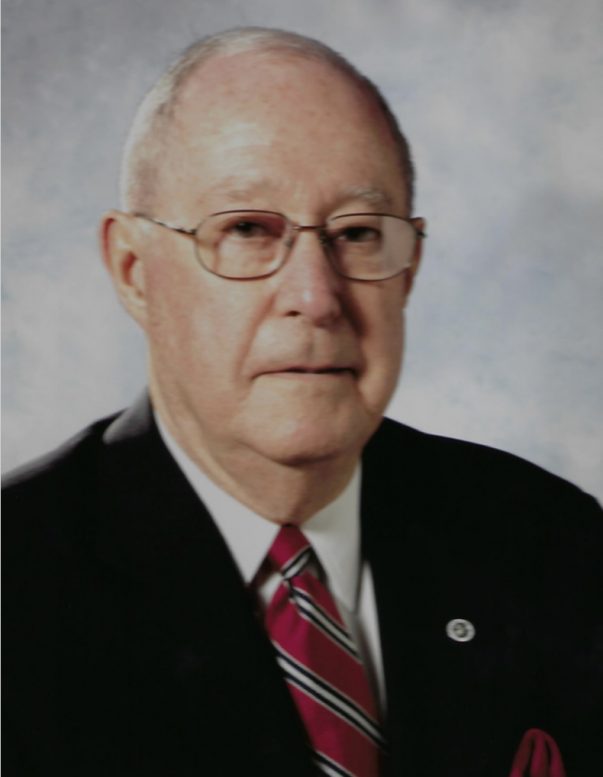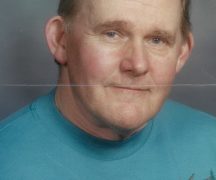Theodore G. Jenkins, a Marine veteran who served his country in two wars, remained active in the Marine Corps Reserve after returning to civilian life, and distinguished himself in the corporate world for Libbey-Owens-Ford, passed away peacefully Friday, September 13, 2019 of complications from pancreatic cancer at his Toledo, Ohio home at the age of 91.
He was an officer and a gentleman, a Marine’s Marine who had the distinction of serving in World War II as an enlisted man and the Korean War as a second lieutenant.
Ted touched thousands of lives as a decorated military commander, a successful business executive with the former Libbey-Owens-Ford Company, and a tireless benefactor and supporter of the alma mater he loved, Bowling Green State University. Ted was born Jan. 28, 1928, in Shelby, Ohio to Theodore S and Yvonne (Faze) Jenkins. He grew up in Norwalk, Ohio and graduated from Norwalk High School. Later, between military stints and again after his active-duty military years ended, he attended BGSU on the GI Bill. Ted lived in the city of Oregon, Ohio after his hire at Libbey-Owens-Ford in 1955. He worked for Libbey-Owens-Ford (now Pilkington) for 35 years, retiring in 1990 as corporate director of human resources at the company’s downtown headquarters.
Ted was one of those people who could not say no to projects and volunteer work, and northwestern Ohio is richer for it. Mr. Jenkins served for several years on the boards of Mercy St. Charles Hospital and Mercy Health Partners, including chairmanships of both; overseeing the operations of 11 hospitals in northwest Ohio and served as a trustee of the former Mercy Hospital. The Oregon Chamber of Commerce named him its Outstanding Citizen of the year in 1979. His advice and counsel were invaluable during his years on the BGSU Alumni Board of Trustees and the BGSU Foundation board, serving both as chairman. He was a charter member of the alumni association’s Endowment Society. His other BGSU affiliations included the President’s Club, Omicron Delta Kappa leadership fraternity, and Theta Chi social fraternity. Years later the university presented him with the Alumni Service Award and the Alumni Community Award. Ted’s passion for the university was matched by his dedication to the welfare of military veterans. His legacy at BGSU is abundantly evident. A few years ago he led a drive to fund POW-MIA chairs at the Stroh Center and other campus locations, chairs that remain forever empty for all those who did not come back from war. Last year he promoted and supported a project of the Student Military Organization on campus to purchase a basketball-court sized American flag for display at athletic contests and special events.
Even as his health deteriorated, he was busy helping university officials plan a veterans’ memorial. A groundbreaking ceremony was held before he died; an event he insisted on attending. Fittingly, the memorial will be located close to the site of the university’s long-gone football stadium, University Field, which served as Ted’s first “dormitory” as a new BGSU student after World War II. The space beneath the stands had been converted to dorm rooms, mostly for veterans. Ted came by his patriotic fervor and sense of military duty honestly enough. His father, also named Theodore, was a highly decorated Army veteran who served in World War I. But it was Ted the younger who earned the unusual distinction of serving as an enlisted man in one war and an officer in another. He enlisted in the Marines near the end of World War II and rose to the rank of sergeant while serving in Puerto Rico and Cuba.
His post-war education at Bowling Green State Universitywas interrupted when he was summoned back to active duty in 1950 and attended officers training school prior to service in Korea. He served as a Second Lieutenant with the Combat Engineers in 1951 and 1952. During Ted’s time in Korea, he became friends with Pulitzer Prize-winning editorial cartoonist Bill Mauldin, who was imbedded with Ted’s unit while on assignment for Collier’s Magazine. Ted also served alongside a man who would go on to stardom in the National Football League, quarterback Eddie LeBaron. After Korea, Ted returned to BGSU to finish his college education, earning a degree in industrial management in 1954. He was a graduate of the Marine Corps Command and Staff College, the Industrial College of the Armed Forces, and the Naval War College. Over the years he became the commanding officer of two Toledo Marine Reserve units. When he retired from the Marine Corps Reserve in 1988, he did so with the rank of full colonel and had 42 years of combined active duty and reserve service.
Truth be told, Ted never really retired from anything. The list of his civic endeavors and public service contributions is a long one. He served for eight years on the Oregon Board of Education. He was vice chairman and a trustee of the Oregon Schools Foundation. He also served on the board of the Toledo Area Chamber of Commerce and was chairman of its Military Affairs Committee. Other boards included the United Way, the Boy Scouts, the Girl Scouts, and the YMCA. Ted served on the board of Ohio Living Swan Creek Retirement Community and was a past chairman of the board of Ohio Presbyterian Retirement Communities. He was a member and elder of Eastminster United Presbyterian Church and a member of the Scottish Rite and Zenobia Shrine. He was a life member of the Lou Diamond Detachment, Marine Corps League, Marine Corps Mustang Association, and was a past commander of American Legion Post 335 in Toledo. In 2009 he was inducted into the Ohio Veterans Hall of Fame. Three years ago he became the first Marine inducted into the BGSU ROTC Hall of Fame.
What many people remember about Ted as much as his impressive record of public service and achievement was his mischievous sense of humor. His supply of jokes and quips was endless. Often they were corny plays on words which induced groans from his companions, just as he intended. He loved the give-and-take banter he shared with friends and family, especially other veterans. Ted awoke one morning to find hisbrother-in-law, Don Saunders, an Air Force veteran, had quietly hung a billboard-sized recruitment poster on Ted’s house overnight as a prank. On another occasion a friend, John Wolf, helped Ted pour the cement for a flagpole at his home so he could fly the Marine Corps flag. Not until the next day did Ted notice his friend had carefully scratched two words in the cement: “Go Navy.” Nobody laughed harder about it than Ted.He followed BGSU sports faithfully. He remained a season ticket holder for Falcon basketball – and a member of the Anderson Club at the Stroh Center – until his death.
Ted is survived by his wife, Anne; daughters Jane Arimoto, of Springfield, Pennsylvania., and Ruth Jenkins (John Moses), of Fresno, California; grandchildren Jordan Arimoto, Cameron (Lauren) Arimoto , Kathryn Jenkins-Moses, Emily Jenkins-Moses; and great-grandchild Baby Arimoto arriving in December; along with Anne’s children, Trudy (John) Aleksander, Mary Beth (Jerry) Wassum, Marian (Jerry) Gomoll, and Frank (Jan) McLaughlin; 10 grandchildren and 3 great-grandchildren. He was preceded in death by his parents; firstwife, Phyllis; sister, Janice Jenkins; and brothers, Ben, Don, and Jack Jenkins.
A Celebration of Ted’s life will be held in the future. Private burial will take place in Toledo Memorial Park Cemetery. In lieu of flowers, contributions can be made to the Ohio Living Swan Creek Life Care Commitment Fund, Eastminster United Presbyterian Church, or the BGSU Veterans’ Memorial Garden. Eggleston Meinert & Pavley Funeral Home is assisting the family with arrangements.





